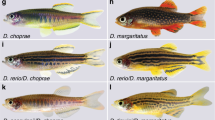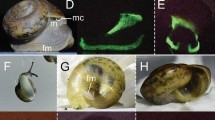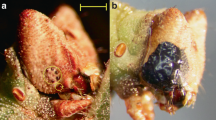Abstract
PHYSIOLOGICAL colour change has been but rarely reported in echinoderms1. Mortensen2, in a footnote, makes cautious reference to the possibility of such changes occurring in Diadema antillarum; but it is clear that he was not aware of the striking manifestation of the phenomenon reported here, which occurs in young forms of this species. Indications of the existence of a rhythmic change in colour persisting under constant external conditions do not appear to have been reported previously in this form, nor indeed, so far as I am aware, in any other echinoderm.
This is a preview of subscription content, access via your institution
Access options
Subscribe to this journal
Receive 51 print issues and online access
$199.00 per year
only $3.90 per issue
Buy this article
- Purchase on Springer Link
- Instant access to full article PDF
Prices may be subject to local taxes which are calculated during checkout
Similar content being viewed by others
References
v. Uexküll, J., Z. Biol., 34, 315 (1897). Kleinholz, L. H., Pub. Staz. Zool. Napoli, 17, 53 (1938).
Mortensen, Th., “A Monograph of the Echinoidea”, 3, 1 (Copenhagen, 1940).
Millott, N., and Jacobson, F. W., J. Invest. Dermat., 18, 91 (1952).
Millott, N., Biol. Bull., 99, 329 (1950).
Author information
Authors and Affiliations
Rights and permissions
About this article
Cite this article
MILLOTT, N. Colour Change in the Echinoid, Diadema antillarum, Philippi. Nature 170, 325–326 (1952). https://doi.org/10.1038/170325b0
Issue Date:
DOI: https://doi.org/10.1038/170325b0
This article is cited by
-
Spectral Sensitivity of Melanophores in the Primary Color Response of the Rose Bitterling, Rhodeus ocellatus ocellatus
Ichthyological Research (1988)
-
Zum Verlauf der Pigmentausbreitung beim Farbwechsel des Seeigels Centrostephanus longispinus Peters
Zeitschrift f�r Vergleichende Physiologie (1968)
-
Pigmentary System of Diadema antillarum Philippi
Nature (1964)
-
Light Emission and Light Perception in Species of Diadema
Nature (1953)
-
Colour pattern and the definition of the species,Diadema antillarum philippi
Experientia (1953)
Comments
By submitting a comment you agree to abide by our Terms and Community Guidelines. If you find something abusive or that does not comply with our terms or guidelines please flag it as inappropriate.



